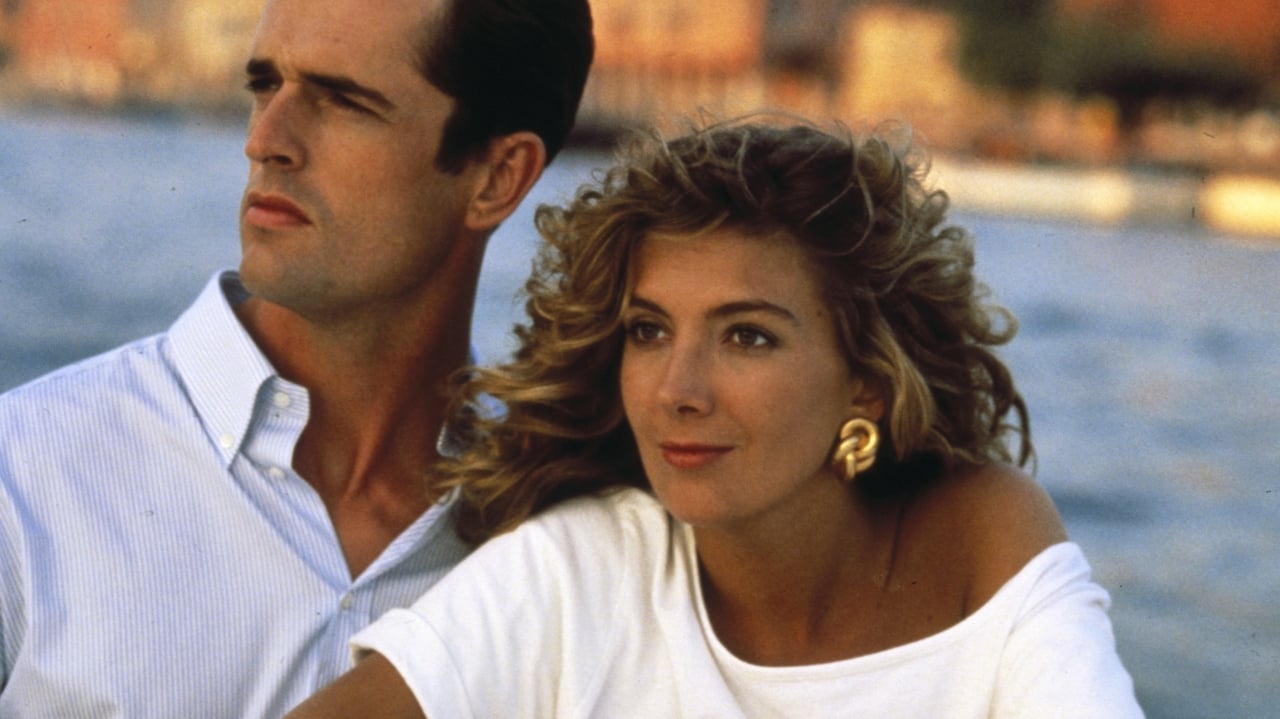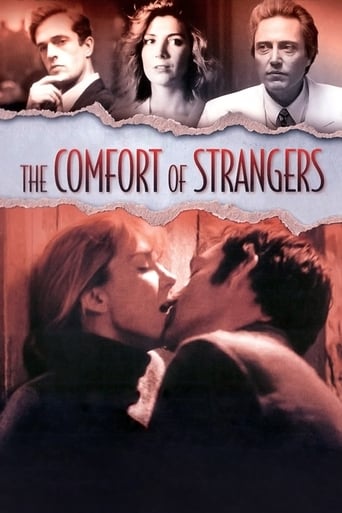pyrocitor
Ever wonder what it would be like to experience Paul Schrader's most famous creation, Travis Bickle, from the outside, only from the perspective of others just as unhappy and almost as weird, albeit more passably 'normal'? Look no further. Penned by the truly impressive one-two punch of Atonement's Ian McEwan (novel) and Harold Pinter (screenplay), The Comfort of Strangers is a haunting, eerie tale of lurid sexuality and obsession, the fallout of familial trauma, and the noxiously addictive nature thereof to bystanders who may not be as innocent as they seem. It's not always an easy watch (no straightforward romance involving Christopher Walken is likely to be). It's liable to leave a thoroughly unpleasant taste in the viewer's mouth, both from its sordid tale of broken humans, and the inconclusive ambiguities therein. But, like many of its thematic and spiritual filmic siblings (Don't Look Now; Last Tango in Paris), which, admittably, the film falls just short of matching up to, there's gruesome beauty to be seen therein, making it a dark but deceptively compelling watch. Any audiences familiar with Pinter's writing will recognize how much he treats words as placeholder artifice, with the deeper truth lying behind non-sequiturs, and, especially, what lies unsaid. He excels at doing so here. For a film that, plot- wise, reads as three successive dinner conversations, dialogue is characteristically sparse, and generally more obfuscating than illuminating. Take Walken's recurring monologue: "My father was a very big man. And he wore a black moustache. When he grew older and it grew grey, he coloured it with a pencil. The kind women use. Mascara." Initially, it's used as a non-sequitur, or social stalling, but every time it's reiterated, each individual word is shown to be essentially deliberate, and tiny, nearly imperceptible character beats (monolithic but paradoxical patriarchy, homophobia, and latent, insecure violence) are unspooled, as if picking at a thread to the point of gradually unravelling a sweater. It's a slow-burning story, and one that certain viewers not as active in inferring subtle character motivations might grow weary of. Regardless, Schrader crafts an atmosphere of supreme decadence and unease, with Dante Spinotti's cameras creeping through the smoky opulence of Venice's back alleys and canals like Nosferatu preparing to pounce on an unsuspecting victim. You almost wish Schrader had pushed things to an even more memorably expressionistic and transcendental level (as someone like Scorsese or Milos Forman might have), but Angelo Badalamenti's exceptional musical score works wonders in sounding classically elegant, yet just subtly discordant enough to make the hairs on the back of the viewer's neck stand up. There's a perennial feeling throughout of a painstakingly laid out trap preparing to be sprung, and the waiting, no matter how much Baroque sightseeing there is to be done, is increasingly agonizing. The central quartet of cast are the binding agent which consolidate all the film's stylistic flourishes into a monstrous symphony, all perfectly in synch with the film's tone and unconventional emotional arc. Natasha Richardson and Rupert Everett are both spectacular as the young English couple travelling (or returning, as we're continually reminded) to Venice to rekindle their passion and contemplate marriage. Both deftly convey the nuances of ennui without overplaying, and, in their mutual, unexpected surge of passion, let slip essential details of far more detailed and grim characters beneath their beautifully disinterested exteriors. Still, the juiciest roles are bequeathed to Christopher Walken and Helen Mirren, and the two live up to the challenge - both are superbly charismatic and unnerving, as well as essentially human, rather than caving to the temptation to inflate their roles into Hannibal Lector human cartoons. Walken's fusion of silky, debonair, laconic charm and demented, inhuman underbelly has never been put to such good use, his every line a purr of concealed lust or threat, while Mirren, pristinely teasing ambiguous notes of either primal fear or psychotic madness beneath her tightly wound housewife exterior, manages to make an equally grating impact with less screen time. There's a theatrical quality to the airtight chemistry the four share, and even as the material fails to come to a climax that properly satisfies after the operatic buildup, they're so riveting you'll be too distracted to sweat the semantics. A somewhat forgotten gem of skin-crawling European lust, The Comfort of Strangers may not quite stretch to the level of timeless classic, but it lingers on the viewer for days afterwards, like a sticky, shameful hangover. Whether to drink in the sumptuous Venetian scenery or the immaculate performances, Schrader and Pinter's Gothic, fatalistic romance is worth taking in on a muggy, cloudy summer night. As Richardson and Everett are sucked in by Walken and Mirren, like spiders jovially binding guests in their web, taking in The Comfort of Strangers can only end in discomfort, but the proceedings are too sickeningly infatuating to escape. -8.5/10
ereinion
The title of this film expresses how it is to be a stranger. Sometimes it can be scary to be in a strange town or city, where you know nobody. Sometimes a friendly face is not to be trusted. This I believe is the real meaning and theme behind this film. There are many perils with being a stranger in a strange place. The couple played by Rupert Everett and Natasha Richardson are about to discover the worst of them.This film by Paul Schrader was adapted from a novel written by Ian McEwen and written for the screen by no one else but the great Harold Pinter. It is then no surprise that it's such a powerful experience to watch it. Christopher Walken hadn't had so many famous villain parts before this but after this, it would become a trademark. He plays a deeply disturbed and obviously sexually repressed American from a wealthy family who lives in Venice with his fragile wife, played equally great by Helen Mirren. They are childless and live alone in a great mansion-like house. They try to make their life (read: sex life) more exciting by finding interesting tourists they can bring into their house and their bizarre world filled with troubled fantasies. Everett and Richardson make their choice. They are an unmarried couple who are obviously in love, but their relationship is not without problems. She is divorced and has children while he has never had children and is not sure if he fits in with her idea of a husband. To cut the long story short, they meet the odd couple while looking for a restaurant one night and at first they seem to bond with them, especially the fragile wife who confesses to them that she is sometimes afraid or at least wary of her husband and his sado-masochistic tendencies. They quickly decide this is not a good couple to be friends with and return back to their hotel, where they start making love like never before. But the sick couple will not be denied of their prey and eventually, things will escalate to a disturbing finale.The story is really well crafted and the characters also. It also helps that all four main actors are really capable in bringing them to life. Music by Angelo Badalamenti is excellent and adds more eeriness and suspense to the already eerie and suspenseful film. This is a character drama which is not for the faint-hearted, especially not the last half hour or so, where things really go bananas. It is a dark and disturbing film about a couple that got lost in a strange city and fell into a trap set by a very sick man. It is a rather unhappy film and just as it seems that things are turning the right way, it again spirals down and comes to a tragic end. It is almost like a Greek tragedy. The lesson? Never trust strangers, especially not smiling ones. The irony is that the villains here are strangers themselves, so the title I think refers to them, not the victims. Their comfort is doing what they do, playing with people.
ametaphysicalshark
"The Comfort of Strangers" sounds superb on paper. Ian McEwan's brilliantly devastating and profoundly disturbing novella adapted by the genius that is Harold Pinter, directed by the excellent Paul Schrader, scored by Angelo Badalamenti, and starring what is essentially a dream cast absolutely perfect for the material. Yet it has a mediocre reputation at best so when I settled down for the viewing I was hopeful but had low expectations.Pinter and Schrader handled two things poorly here- the ending, and the introduction of Christopher Walken's character, Robert. I'm not usually too concerned with faithfulness to the source material but what McEwan did with both aspects in the novella definitely did not require any sort of alteration. McEwan plays with the comfort level of the audience and characters more than Pinter does, causing the story to be even more sinister and disturbing as it develops. Pinter begins the film with a voice-over narration by Robert and we see Robert in flashes well before meets Colin and Mary and takes them to his bar. In short, we are told explicitly that Robert is a villain from the opening of the film, and Pinter also lets him take a bit too much screen time away from Colin and Mary. Walken is excellent in the role, however. The ending, while disturbing and unforgettable in the novella, is a predictable and simple conclusion on film. There's also one or two things that happened during the climactic scene that don't make sense at all within the narrative of the film and which did make sense in McEwan's book. Another questionable alteration.Other than those faults "The Comfort of Strangers" is an absolutely tremendous and amazingly involving film with a brilliant script by Pinter which allows for more nuanced characters and a different approach than McEwan's novella featured, and superb work by Paul Schrader as director, who uses Venice brilliantly her to create mood and ambiance and certainly shoots the film very, very well, with one scene, where Robert is discussing his relationship with his father and sisters with Colin and Mary in the bar which is shot stunningly well. I won't give away Schrader's use of imagery here but it is such a well-crafted scene that the version in my head of the scene seemed terrible in comparison. The film is also shot exceptionally well by Dante Spinotti, a quality cinematographer famed for his work on films like "Heat" and "L.A. Confidential" among others. Complimenting Schrader's work, which is probably his most impressive outside "Mishima: A Life in Four Chapters", and at times superior to that, is one of Angelo Badalamenti's most memorable and distinctive scores. I actually had Rupert Everett in mind for Colin well before I even knew this film existed and he didn't disappoint at all in the role. Natasha Richardson was out of left field for me but the casting worked spectacularly well here, and it goes without saying that Helen Mirren is superb as Robert's wife Caroline. Mirren's Canadian accent is spot-on as well. "The Comfort of Strangers" is significantly less heady than its prose version, choosing to function as a thriller with some thematic preoccupations instead. What is surprising about this film is just how well it works as a thriller. The novella thrives on an atmosphere of tense, sinister unease but much of that is derived from Colin and Mary's relationship rather than any plot mechanics. This film is more a traditional thriller but it is tremendously tense, involving, and exciting from start to finish. A quality film, one of Schrader's best as director and some of Pinter's finest film work.9/10

